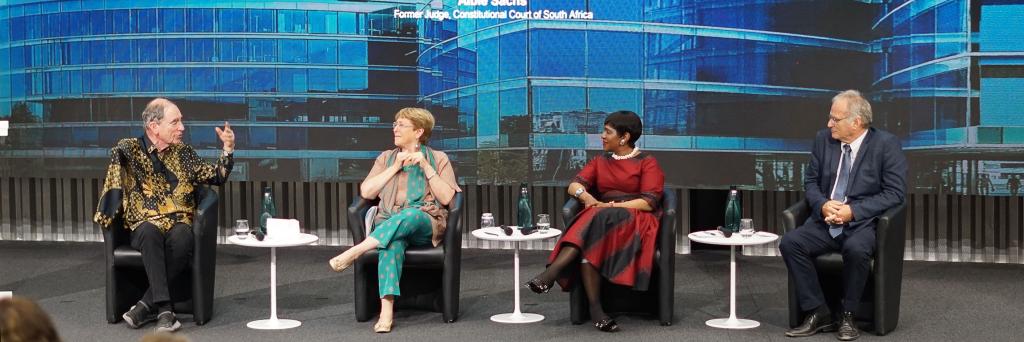“A piece of paper, a body, a voice and the dreams of millions of people, including our hope; for those of you in the audience, that’s my text for today”, began Mr Sachs, who had fought against apartheid since age 17, was appointed by Nelson Mandela to the Constitutional Court of South Africa in 1994 and played a critical role in the creation of the first draft of South Africa’s Bill of Rights, adopted in 1996 by the South African parliament as an integral part of the South African Constitution.
In an hour-long, riveting lecture, Mr Sachs explained that his efforts to establish a rule of law in South Africa were a form of “soft vengeance” against apartheid, exemplified through his own, personal tribulation.
On 7 April 1988 in Mozambique, as he was on his way to his car, a bomb fixed under it exploded. He fell into “total darkness” following the blast and awoke in Maputo Central Hospital, where he was told he had lost his right arm. “I fade back into the darkness but with a sense of joy”, he continued. “That moment every freedom fighter is waiting for: Will they come for me? Will they come for me today? […] And they’d come for me and they tried to kill me and I survived, I feel triumphant”.
Commenting on the trial of one of the accused car bombers, Mr Sachs said, “My vengeance will be if the person receives a fair trial, and if his guilt is not beyond doubt, will be acquitted, because this will prove that we will have established the rule of law”.
Michelle Bachelet, in turn, recounted her own experience as a human rights defender. She told of dictatorship in Chile, the torture and killing of her father, and her mother’s detention. In defiance of the anger she felt about her family’s suffering, she found the perseverance to stand up and act for change, becoming the first woman President of Chile (dually elected), then Executive Director of UN Women, and eventually replacing Zeid Raad Al Hussein in 2018 as the UN High Commissioner for Human Rights.
“[…] the world today faces complex challenges, challenges too big for one country, challenges that do not respect borders”, she said. “[…] And we see a pushback on human rights. And I say, let’s push back the pushback”.
The Nelson Mandela Human Rights Lecture was co-organised by the Graduate Institute, the Geneva Academy and the Centre for Human Rights of the University of Pretoria, in collaboration with the Washington College of Law at the American University, the Human Rights Council Branch at the Office of the UN High Commissioner for Human Rights, the Global Campus of Human Rights, and the South African Permanent Mission to the United Nations.
Watch the lecture:


